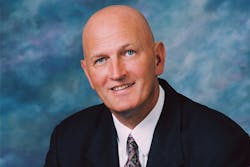Dave Dunn on Leadership
Dave Dunn is a can-do guy. A high-school-dropout at 16, he went to work in an auto body shop. Three years later, he was running his own. A year later, the local Lincoln Mercury dealership hired him to manage its collision repair center. In that five-person shop, Dunn gained invaluable experience with newer cars, crash work and great mentoring. At 22, he was his own boss once again, and has been ever since. For 32 years, Dave’s Auto Body has hummed along in Galesburg, Ill., in its original location. The shop is a success by any metric, employing 28 people and grossing nearly $4 million in annual sales.
Dunn is the founder of the Masters School of Autobody Management, the nation’s only permanent facility dedicated to collision repair management education. Dunn is a licensed teacher of post secondary education. He is a columnist for Dealer Fixed Operations magazine and author of Liquid Amalgam, a book about service company management. Here, Dunn schools us on leadership, current business opportunities for shop owners and managers, and the future of the industry.
Dave Dunn is a can-do guy. A high-school-dropout at 16, he went to work in an auto body shop. Three years later, he was running his own. A year later, the local Lincoln Mercury dealership hired him to manage its collision repair center. In that five-person shop, Dunn gained invaluable experience with newer cars, crash work and great mentoring. At 22, he was his own boss once again, and has been ever since. For 32 years, Dave’s Auto Body has hummed along in Galesburg, Ill., in its original location. The shop is a success by any metric, employing 28 people and grossing nearly $4 million in annual sales.
Dunn is the founder of the Masters School of Autobody Management, the nation’s only permanent facility dedicated to collision repair management education. Dunn is a licensed teacher of post secondary education. He is a columnist for Dealer Fixed Operations magazine and author of Liquid Amalgam, a book about service company management. Here, Dunn schools us on leadership, current business opportunities for shop owners and managers, and the future of the industry.
What prompted you to start the Masters School of Auto Body Management?
I ran Dave’s Auto Body so that I could be away from the shop by the time I was 30. Back then, it was unheard of for a young guy to operate as an absentee owner, so people started calling and asking me to consult. After about 10 years, I wanted people to come to me, so I started Masters School of Autobody Management, with two partners, Brian Evison and Joe Hinkens, who have since gone on to do their own successful things. We remain friends and talk occasionally.
What skills do shop owners need?
People skills. Unless a leader can harness the collective strength of his or her staff, they will have only
marginal success. Another important trait: organization. Most managers have to learn to be organized. These are the two “secrets” we help people with at Masters.
Where do you see owners struggling as managers?
Most shop owners are poor delegators. They maintain a technician’s mindset that no one can do anything as well as they do. Hence they find themselves working in their businesses and not on their businesses.
What’s the take-home message from Liquid Amalgam?
Govern your business and your life by “unchangeables.” Unchangeables are the principles that serve as a litmus test for decision making. If you can learn to articulate your principles for decision making to your staff, your
employees will show greater initiative.
The economy stinks. What opportunities exist for shops right now?
So many managers have turned into order-takers instead of salespeople. While your competitors are sniveling about how bad it is out there, the winners are moving ahead with a Total Sales Attitude (TSA) and capturing the market that’s there to be had. TSA is a culture, [and it] exists when it becomes clear that everyone—from the janitor to the owner—wants your business and will do whatever is appropriate to get it.
Economy aside, what challenges shops most these days?
Too many shops are DRP dependent. When times are tough, they get beaten down at the transactional level. Shops need to develop “relational” customers. Half of the general population is relational buyers and half are predisposed to be transactional buyers. Most shops make overtures that are transactional, and fail to capture the relational nature of half the population. Hence, when the relational buyer observes mediocrity from the service provider, price becomes the only differentiator.
How do you envision the future of the collision repair industry?
Education will take a larger role in the shops, including the leadership level and the technical side. The large will not eat the small, the swift will eat the slow. Shops that understand the economy of speed and quality will prevail.
